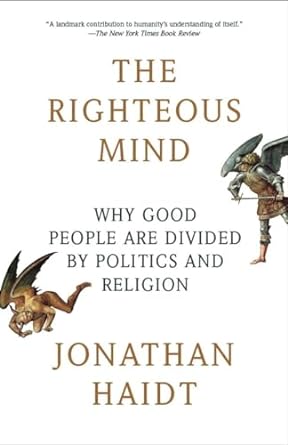More on this book
Community
Kindle Notes & Highlights
Read between
July 19, 2017 - April 1, 2021
This book is about why it’s so hard for us to get along. We are indeed all stuck here for a while, so let’s at least do what we can to understand why we are so easily divided into hostile groups, each one certain of its righteousness.
I agree. This book is a good read. Most of us agree on the ends but we now just fight about the means.
When I was a teenager I wished for world peace, but now I yearn for a world in which competing ideologies are kept in balance, systems of accountability keep us all from getting away with too much, and fewer people believe that righteous ends justify violent means. Not a very romantic wish, but one that we might actually achieve.
We are indeed selfish hypocrites so skilled at putting on a show of virtue that we fool even ourselves.
As Darwin said long ago, the most cohesive and cooperative groups generally beat the groups of selfish individualists.
We’re not always selfish hypocrites. We also have the ability, under special circumstances, to shut down our petty selves and become like cells in a larger body, or like bees in a hive, working for the good of the group.
People bind themselves into political teams that share moral narratives. Once they accept a particular narrative, they become blind to alternative moral worlds.
But in Europe and elsewhere, the word liberal is truer to its original meaning—valuing liberty above all else, including in economic activities.
but the take-home message of the book is ancient. It is the realization that we are all self-righteous hypocrites:
The struggle between “for” and “against” is the mind’s worst disease.
Understanding the simple fact that morality differs around the world, and even within societies, is the first step toward understanding your righteous mind.
The next step is to understand where these many moralities came from in the first place.
this book I’ll use the word rationalist to describe anyone who believes that reasoning is the most important and
reliable way to obtain moral knowledge.8
The moral domain varied across nations and social classes. For most of the people in my study, the moral domain extended well beyond issues of harm and fairness.
The biggest surprise was that so many subjects tried to invent victims.
We’re born to be righteous, but we have to learn what, exactly, people like us should be righteous about. TWO
“I am dragged along by a strange new force. Desire and reason are pulling in different directions. I see the right way and approve it, but follow the wrong.”
And just in case there was any doubt about Plato’s contempt for the passions, Timaeus adds that a man who masters his emotions will live a life of reason and justice, and will be reborn into a celestial heaven of eternal happiness. A man who is mastered by his passions, however, will be reincarnated as a woman.


